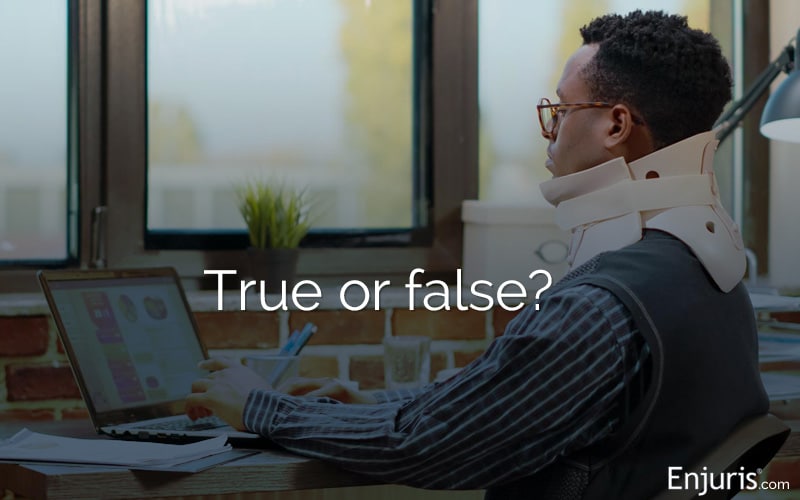
Workers’ compensation can be a confusing area of law. To make matters worse, the Internet is flooded with misinformation. In this post, I’ll look at some of the most common misconceptions surrounding workers’ compensation in Alabama.
Armed with the correct information, you’ll be better equipped to protect your rights and interests when filing a workers’ compensation claim.
Misconception 1: You need to prove that someone was at fault for your accident to receive compensation under the Alabama Workers’ Compensation Act.
Workers’ compensation is a no-fault insurance system, meaning injured workers can receive workers’ compensation benefits regardless of who’s at fault for their injury.
Unlike personal injury lawsuits, where the plaintiff must prove that someone’s negligence or wrongful act caused their injury, injured employees only need to prove that their injury “arose out of and in the course of their employment.”
Generally speaking, an injury arises out of your employment if there is some causal connection between the conditions under which you had to work and your resulting injury. For example, if you injure your back while lifting bricks for a masonry company, your injury arose out of your employment.
An injury arises in the course of your employment if the injury occurs:
- Within the period of employment,
- At a place where the employee may reasonably be in the performance of their duties, and
- While the employee is fulfilling those duties or engaged in something connected with those duties.
Misconception 2: Accidents caused by co-workers aren’t covered under the Alabama Workers Compensation Act.
Injuries caused by co-workers are typically covered under the Workers' Compensation Act. The big exception is if the injury was caused by an intentional act. As stated in the Alabama Workers’ Compensation Act:
“[A compensable] injury does not include an injury caused by the act of a third person or fellow employee intended to injure the employee because of reasons personal to him or her and not directed against him or her as an employee or because of his or her employment.”
In such cases, the injured worker would need to file a personal injury lawsuit against the co-worker to recover damages.
Misconception 3: Remote employees can’t receive workers’ compensation benefits.
As of 2023, almost 13 percent of full-time employees work from home, while almost 30 percent participate in a hybrid model.
In our increasingly digital age, there’s a growing misconception that remote employees can’t receive workers’ compensation benefits. However, the reality is that the location of your work doesn’t change your eligibility for workers’ compensation.
As long as your injury “arose out of and in the course of your employment,” it will likely be compensable under Alabama’s workers’ compensation laws. With that being said, proving that an injury arose out of and in the course of your employment may be more challenging as a remote worker.
Misconception 4: You can’t be compensated under Alabama’s workers’ compensation laws for mental health issues.
Generally speaking, the Alabama Workers’ Compensation Act covers medical expenses, lost wages, and vocational rehabilitation for injured workers. However, the Act has specific requirements and exclusions when it comes to mental injuries.
There are two types of mental injuries under the Alabama Workers’ Compensation Act:
- Mental-physical injuries: A mental-physical injury refers to a mental injury that results from a physical injury sustained at work, such as depression that develops as a result of chronic pain caused by a workplace accident.
- Mental-mental injuries: A mental-mental injury refers to a mental injury that arises from a psychological stimulus, such as PTSD that arises after witnessing a traumatic event at work.
In Alabama, mental-physical injuries are compensable under the Alabama Workers’ Compensation Act so long as the mental injury can be directly traced back to a work-related physical injury. Notably, the physical injury doesn’t have to be the sole cause of the mental injury, but the physical injury must be a factor in causing the mental injury.
Mental-mental injuries, on the other hand, are not compensated. Under existing workers’ compensation law, mental illnesses, such as PTSD, are not covered if a physical injury does not accompany the mental illness.
Misconception 5: You have to sue your employer to receive workers’ compensation benefits.
Another common misconception is that receiving workers' compensation benefits involves suing your employer. This is simply not true. Workers' compensation is a type of insurance that employers carry for the protection of their employees. Filing a claim is not a lawsuit against your employer but a request for benefits due under the insurance policy.
The workers' compensation system was designed to help injured employees receive the care and support they need while avoiding adversarial legal battles. Nonetheless, it's advisable to consult with an attorney experienced in workers' compensation law to ensure that you understand your rights and that your interests are adequately protected.
Understanding workers' compensation in Alabama can be daunting, especially with all of the misconceptions floating around. Remember, each case is unique. For personalized advice, consult an experienced attorney. At Nomberg Law Firm, we offer free initial consultations. Stay safe and informed.

